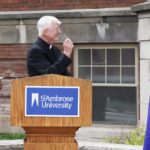
By Ella Johnson
I remember a conversation I had with my spouse about 14 years ago, when we were at our marriage preparation retreat. We were talking about our favorite prayers in the Mass. (By the way, this is not something we typically spend a lot of time talking about on our own, which is probably why I remember it so vividly.) He told me that his favorite prayer was, “Only say the word and I shall be healed.” We talked about how comforting the phrase is to declare before approaching Eucharistic Communion. It’s a brief and simple prayer, but it packs a punch — stressing complete trust and confidence in the healing power of God.

The prayer is adapted from the Gospel miracle of the raising of the centurion’s servant (Matt 8:5-11). The specific text of the prayer, in its original setting, is uttered by the man seeking Jesus’ help and trusting in his powerful words.
When we proclaim these adapted words of the centurion at Mass today, “Only say the word and my soul shall be healed,” as we prepare to receive Eucharist, we are reminded that we are healed and strengthened by the proclaimed Word and by sacramental Communion. Vatican II’s Constitution on the Sacred Liturgy underscores the interrelationship of word and sacrament: “The liturgy of the Word and the liturgy of the Eucharist … are so closely connected that they form but a single act of worship” (#56). In other words, we are nourished at Mass by the Word and the altar table.
The presumption here is that the words proclaimed in the liturgy are not just meant to convey ideas or information but are avenues through which God can act among us and for our salvation. The proclamation of Isaiah expresses the effect of God’s words similarly, i.e., how it accomplishes God’s will and renews believers: “For as the rain and the snow come down from heaven, and do not return there until they have watered the earth, making it bring forth and spout, giving seed to the sower and bread to the eater, so shall my word be that goes out from my mouth; it shall not return to me empty, but shall accomplish that which I purpose, and succeed in the thing for which I sent it” (Isa 55:10-11).
This renewal and accomplishment of God’s will can happen in the liturgy of the Word, when we proclaim the sacred texts and respond to them in faith. Theologian Msgr. Kevin Irwin writes about this idea in his book “Models of the Eucharist.” He calls it the “effective word of God:” “What we hear, happens. What we proclaim, occurs” (page 86). We are asked to express and assent to this idea when we respond, “Thanks be to God,” to the statement, “The word of the Lord,” and when we say “Praise to you, Lord Jesus Christ,” after the Gospel proclamation. In these responses, we are committing aloud — for all those around us to hear — to the Word proclaimed, with all of its demands, paradoxes, challenges and encouragements. Then the renewal can begin.
These words and responses aren’t magic. God is relational, gracious and humble. God waits for our response and open acceptance of the Word taking root in our lives, to renew and re-create us.
This all leads me to think about the times or stages in my life, when I’ve said, “Thanks be to God,” but was too distracted or didn’t really hear or understand the Word proclaimed enough to mean it. My husband and I, now 14 years after our marriage preparation retreat, attend Mass with our 6-year-old daughter. Her level of activity in the pew means that we are distracted most Sundays. I trust that God knows my intention to hear and respond to the Word proclaimed. After all, I don’t think I’ll ever be distraction-free or perfectly understand the Scriptures. Of course, my daughter, who is part of the assembly, bears the presence of Christ as well!
Still though, this model of the Eucharist reminds me of the importance of listening to the Word so I don’t miss God’s presence there as well. In this stage of life, I’m helped by reading the lectionary readings during the week or before Mass and by doing things such as lectio divina (a meditative way of reading the Bible), audio apps and Bible studies. It’s a helpful way to deepen my commitment to the proclaimed Word.
“Thanks be to God” is now my favorite prayer of the Mass. It gives me great comfort and peace to know that, despite my distractions and limitations, “What we hear, happens” and “What we proclaim, occurs.”
(Ella Johnson, PhD, is an associate professor in the theology department of St. Ambrose University in Davenport.)










